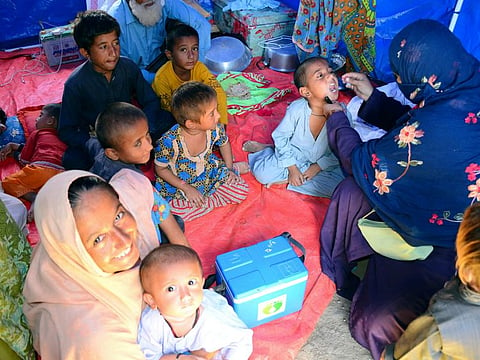Pakistan sets up medical camps to treat people; WHO warns of infections among newborns
Half a million flood-displaced people in relief camps

ISLAMABAD: While Pakistan’s rescue teams with support from the international aid agencies and friendly countries are busy in relief and rehabilitation operations across Balochistan, Punjab (south), Khyber Pakhtunkhwa (KP) and Sindh, the local authorities have expressed fears of the outbreak of infectious and waterborne diseases among people, particularly, mothers and their newborns.
Responding to these concerns, Federal Minister for National Health Services, Abdul Qadir Patel, has announced the establishment of 1,200 medical camps in the flood-hit areas.
These camps will provide basic health facilities — besides medicines and vaccination facilities — to the flood-affected people. A number of countries have also sent their medical teams along with medicines and latest equipment to provide immediate relief to the affected people.
The people of these areas are complaining of skin diseases, eye infections and diarrhoea, he said.
Giving details, the Minister said 400 medical camps are established in 8 districts of KP including Dera Ismail Khan, Peshawar and Tank while 300 are set up in 6 districts of Balochistan and 95 in Karachi alone.
WHO cautions against disease outbreak in relief camps
Meanwhile, the World Health Organisation (WHO) has expressed concerns over the spread of waterborne diseases among flood victims, particularly mothers and children. Nearly half a million flood-displaced people are living in relief camps.
In a post on social media, the WHO Pakistan called for prioritising maternal and child healthcare. Maternal and newborn health is compromised in flood-affected areas and the WHO teams are working closely with partners to enhance maternal health service delivery, said the WHO Pakistan in a tweet on Monday.
Fully-equipped medical camps in Balochistan
WHO Pakistan Representative Dr Palitha Mahipala recently visited Balochistan’s District Lasbela to open two medical camps (a mobile camp and a fixed camp).
A mobile medical camp is also set up in Goth Ilyas Oba while two in Tehsil Lakrha. The area is the first place that is accessible to health teams. The mobile camp will run for 2 weeks and the fixed camp is established in BHU Sukan.
The medical camps are fully equipped with basic diagnostic and treatment facilities.
During his visit, a high number of malaria, skin disease and diarrhoeal cases were reported in the Out-Patient Departments (OPDs).
The suspected patients are screened for malaria through Rapid Diagnostic Testing and treatment. The people in the area welcomed the camps and highlighted the need for clean water, shelter and cooked food.
According to a report released by the Sindh health department, diarrhoea, skin diseases and eye infections are spreading at relief camps set up by the government across the province.
More than 134,000 diarrhoea cases were reported from Sindh in the past two month, said a report released by the health officials.
“The magnitude of physical and human cost is colossal. Our hearts are with people affected by this calamity. We have enhanced efforts to scale up emergency health service delivery to meet the immediate health needs of the affected population,” remarked WHO Pakistan Representative
Like in Balochistan, the WHO Pakistan has also set up two free medical camps in Southern Punjab’s District Rajanpur’s village Kot Mithan.
WHO is immediately setting up its Emergency Operation Centre in Rajanpur to support flood response operations & medical camps in affected areas, it said on Monday.
Sign up for the Daily Briefing
Get the latest news and updates straight to your inbox



